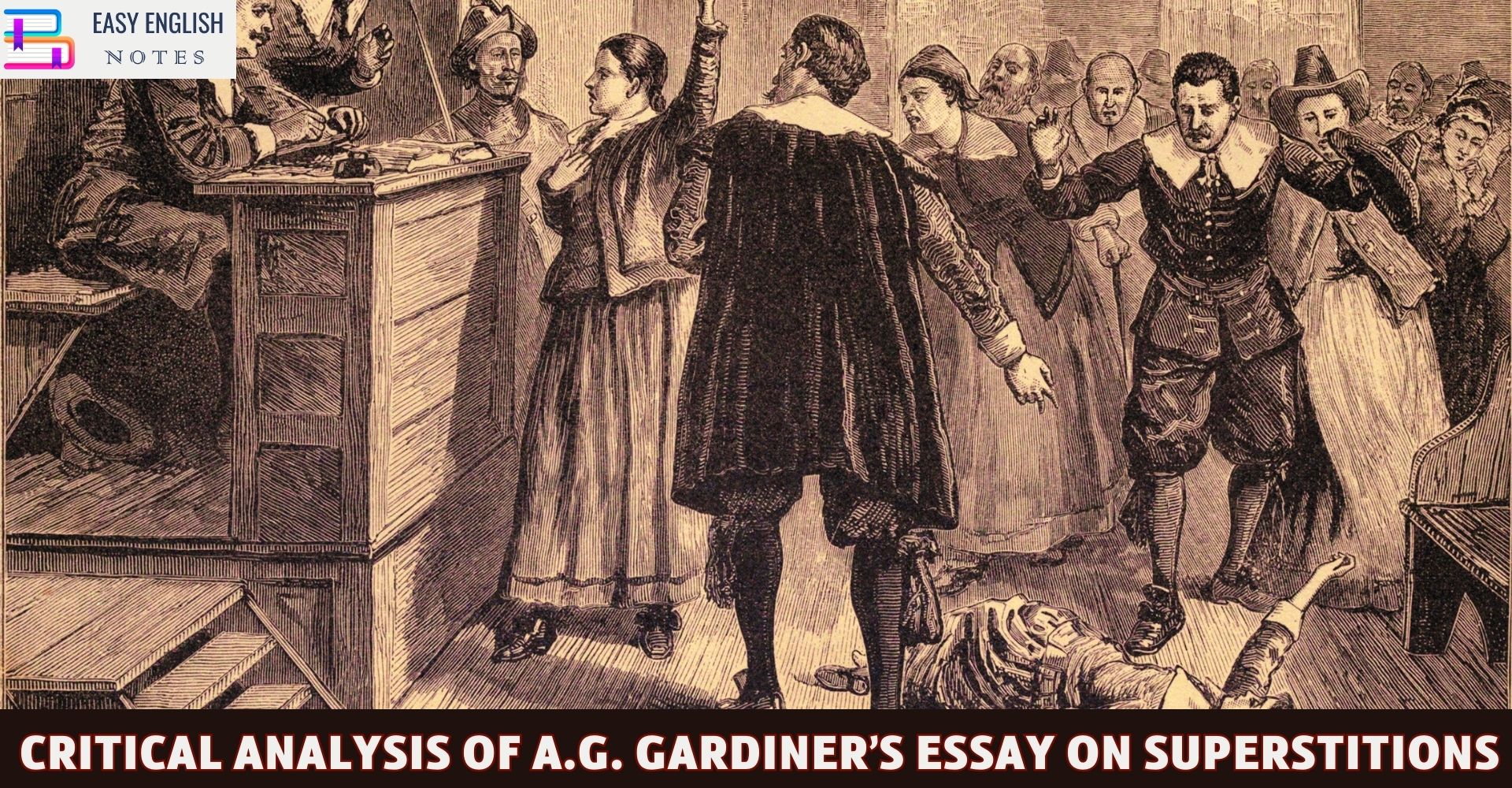Alfred George Gardiner is the writer of some of the most celebrated journalistic essays. He wrote under the pen-name, Alpha of the Plough. Gardiner’s essays are apparently of casual type as most journalistic articles and features are.
Superstitions means a set of blind beliefs, uncritical prejudices and preconceived notions which inhibit freedom of thought. On Superstitions is a Serio-comic essay. Gardiner purports to deal with the serious topic of superstitions but the treatment is playful. The essay is full of very many examples of superstitions or beliefs uncertified and unconfirmed. No. 13 is an unlucky number and is at the centre of superstitious beliefs. Everybody takes notice of the house number, in which a murder has been committed. Though many such murders may have taken place at House number 6 or No. 7. it goes unnoticed. “Not that the world believes there is anything in the superstition.” It is quite sure that the superstition about number 13 being unlucky is a childish superstition. But most of us would be just a shade happier if that desirable residence were number 11. Superstitions do influence human conduct. Number 13 is superstitiously avoided. It influences a landlord to evaluate the letting qualities of his house. The hospital authorities should also calculate the curative properties of their hospital if located in Street number 13. Number 13 often influences with the mental health of the patient. “The slightest shadow on the mind may, in a condition of low vitality, retard and even defeat recovery.” Florence Nightingale’s almost passionate advocacy of flowers in the sick bedroom was based on the healthy presupposition about sweet fragrance being highly conducive to recovery.
A.G. Gardiner refers, in this context, to the testimony of a French writer and doctor who served in World War 1st in his reminiscences of the War. He records how a soldier who had been seriously injured in battle and was brought to the military hospital in a critical condition was slowly patched up and seemed to have been saved when a pimple appeared on his nose. The growth of the pimple on his nose cast such a gloomy shadow on the wounded soldier’s mind that he died from a nervous breakdown. It was nothing, in itself, “says the essayist,” but it was enough to produce a mental state that checked the flickering return of life. Though the soldier in the critical condition survived the blows of fate, he died of something less than a pin-prick. Similarly, any association with number 13 may spell disaster.
Also Read :
- Compare Hamlet with Macbeth, Othello and other Tragedies
- “The Pardoner’s Tale” is the finest tale of Chaucer
- Prologue to Canterbury Tales – (Short Ques & Ans)
- Confessional Poetry – Definition & meaning
- Line By Line Explanation Of The Poem The Eve of St. Agnes
The author wittily says that he cannot claim to be wholly free from superstitions. However, he confesses that the number 13 is the less that he frequently uses in London. He comes under the influence of superstitious belief that it is advisable for him to walk round a ladder placed against a house-side rather than under it. This is by no means a homage to a foolish superstition, but a duty to the family. He is afraid of being hit seriously by at man climbing up the ladder. Gardiner notes that many of our superstitions have sensible and common place origin. The Jewish objection to pork as unclean on religious grounds is the only due to the fact that in Eastern climate it is unclean on physical grounds. He walks under the ladder simply to avoid all those difficulties. The author is satisfied when he sees the new moon in the open rather than through glass, and over his right shoulder rather than over his left. People are subject to blind habits which cause mechanical reflex action.
All these Gardiner describes as a shadowy reminiscences of antique credulity which we discover in ourselves play no part in the lives of any of them. To quote the words of Wordsworth in The World is Too Much With Us, “They belong to a creed outworn.” Science minimized the importance in superstitions by revealing the laws of the universe and putting the man in his place. When scientific knowledge was undeveloped man was highly superstitious. The Greek historian explained how battles were postponed because of some women. Pompey the Roman Emperor got the Election to the Senate of Rome postponed on hearing the rumble of thunder. Alexander the Great’s military expeditions were guided by his counsellors. Even so modern and intelligent a person like the Roman orator and rhetorician Cicero believed in augurs and superstitions. Cicero lost his life by believing in the symbolic meaning of the movement of crows.
A.G. Gardiner is proud of being born in the present rational age. He has the perception that there is something mysterious and very powerful which control our lives. Quoting from Thomas Hardy’s epic-drama, The Dynasts, in the present age of scientific advancement, we are becoming less and less superstitious.
Aldous Huxley, however, in his essay entitled superstitions points out that we are still superstitious. Forms change but the substance remains. Forms of blind beliefs might have changed but we can still prone to be influenced by blind beliefs.
PLEASE HELP ME TO REACH 1000 SUBSCRIBER ON MY COOKING YT CHANNEL (CLICK HERE)











